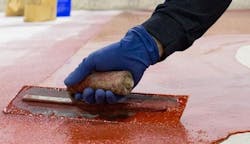4 Ways Resinous Urethane Cement Flooring Improves Safety
If you work in the food processing industry, you know how important it is to adhere to the proper United States Department of Agriculture (USDA) standards in your facility. From machinery maintenance to employee attire, strict guidelines need to be followed in order to comply with USDA regulations. While you may not often think about it, the flooring in your food processing facility is an element that probably faces the most wear and tear on a daily basis. Foot traffic, food debris, cleaning chemicals, and more, are all components that need to be taken into consideration.
According to the USDA, industrial flooring in food manufacturing facilities need to be durable, easily cleaned, be installed without seams, graded for drainage, and impervious to moisture. The floors must also reduce the growth of bacteria and mold to guard against any contamination. At Surface Technology, we are experts in industrial flooring and can install a variety of USDA-approved coatings for your business. In this post, we will highlight some of the benefits of a resinous floor application and how it can be an ideal flooring solution for your food processing plant.
Impact, Abrasion, Chemicals, Thermal Shock, and Slip Resistance
One of the best benefits of resinous flooring is that it is impervious to just about everything. From harsh chemicals to variances in temperature, urethane cement is likely going to be your flooring of choice in food processing industries. Valued for its long lifespan, urethane cement will also require less maintenance than a sealed concrete floor. Since it’s already installed on durable concrete, epoxy or urethane will protect the floor from moisture, stains, and cracks over time. In addition, its natural slip resistance (especially when textured) will allow for improved safety in the workplace.
Can Create Designated Traffic and Work Flows
Instead of having signs to designate traffic and workflow in your food processing plant, consider using different colors of resin on your industrial flooring. By color coding walkways and traffic areas, you can implement better safety guidelines and avoid traffic and/or pedestrian accidents in your facility. You can also use colors to put up visual distance and safety barriers around specific equipment to avoid any potential injuries.
Increases Visibility and Aesthetics
A lesser known advantage of urethane cement flooring is that, due to its high gloss, it can help to increase visibility in the workplace. Depending on the color of the resin, the surfaces can be made “brighter” in certain areas where more reflectiveness may be needed. The light in your building will reflect off the floors, while the glossy look will give your facility a clean and professional look.
Improves Sanitation and Makes Cleaning Easier
Sanitation is extremely important in the food processing industry. Certain food byproducts such as fats, oils, acids, blood, and sugar are likely to fall onto the ground, and it’s essential to have the proper protection to avoid future contamination. When you use resinous flooring, not only will you be providing that extra protection against alkalis and acids, but your floor will also be able to tolerate all of your cleaning chemicals and procedures. This type of industrial flooring is also resistant to germs and bacteria, making it much easier to sanitize. The smooth, glossy surface of resin can be swept or rinsed easily with no worries of moisture or mold build up. No matter the type of food processing plant, Surface Technology will gladly work with you to install the type of coating that best works for your facility. Our seamless flooring solutions will meet USDA guidelines and help improve safety for your workplace at the same time. For over 30 years, we have earned a solid reputation for superior quality flooring and are ready to work with you. Contact us to schedule a free site visit from one of our experts and explore industrial flooring solutions for your facility today!
